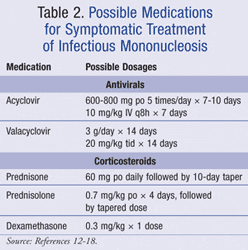Contents
Medical treatments for infectious mononucleosis
How to cure mononucleosis?
There is no specific treatment to cure mononucleosis. It is a mild illness that usually goes away on its own after 4 to 8 weeks, although fatigue can last for several months. The goal of treatment is therefore to provide supportive care until recovery.
Some tips for a good recovery
- Observe a good rest period (some people will need to leave school or work for a few days or weeks) and gradually return to previous activities. You have to know how to listen to your body (and in particular its fatigue) so as not to ask too much of it, at the risk of delaying healing.
- Drink plenty of water, broths and juices to prevent Dehydration. Be careful, alcohol is not allowed as long as the liver can be affected!
- To relieve sore throat, gargle with a solution ofsalt water (½ teaspoon of salt in a glass of water) several times a day.
- Drink and eat cold or even frozen foods. When they are not well tolerated, avoid spicy or acidic foods which irritate the throat even more.
- The ambient air must not be too dry or too hot. Ideally, the temperature should therefore be below 19 ° C, with a humidity of 55%. And to reduce the concentration of microbes in the room where the patient is resting, it is imperative to ventilate (and therefore open the windows wide) for at least 20 minutes, every day and in all weathers.
- Adopt a balanced diet to help the body get over the virus (see How to eat well?).
Precautions in case of mononucleosis
- Give up demanding sports and contact sports for at least 2 months to avoid ruptured spleen. The spleen remains fragile even if it is not swollen.
- Avoid lifting heavy objects for at least 2 months to prevent ruptured spleen.
- Precautions to be taken also for those around you!
- The risk of transmitting the virus to those close to them is real. To limit this risk, you should wash your hands often with soap, use a disposable tissue to blow your nose, sneeze or cough (and wash your hands well afterwards), and do not kiss anyone until there is a risk of contagion, do not share food or cutlery or toiletries and disinfect any object used by the family (such as a telephone, a computer keyboard, etc.).
Medicines to relieve symptoms
If needed, medications can help treat complications or relieve symptoms, if they are severe.
Analgesics. To relieve fever, headaches, throat pain and aches, the doctor may advise taking paracetamol or, if this is not possible, anti-inflammatory drugs which also have an analgesic and antipyretic effect (against fever), such as ibuprofen. Caution : aspirin is strongly discouraged in cases of viral infections for children under the age of 16, as it can cause Reye’s syndrome, a rare but serious condition which can be the source of neurological sequelae and / or ‘liver damage or even death.
Antibiotics. Some people affected by mononucleosis simultaneously develop a bacterial infection throat, sinuses, or tonsils. Certain types of antibiotics, such as ampicillin and amoxicillin, should be avoided, however, as they can cause a skin reaction all over the body in people who have mononucleosis. A skin reaction to an antibiotic that occurs during mononucleosis does not necessarily mean that the person is allergic to the drug.
Corticosteroids. Corticosteroids are not prescribed automatically. They are sometimes prescribed in cases of abnormal increase in the size of the tonsils (which may obstruct the airways), or to treat other serious complications, but the analysis of several studies of the use of corticosteroids against the symptoms of infectious mononucleosis versus placebo, did not find sufficient evidence of their benefit in this indication. In addition, there is a lack of research on side effects and long-term complications.4.










